ECONOMIC OUTLOOK AND INDICATORS IN GEORGIA
HOTEL PRICE INDEX
PMC RESEARCH - IFO GEORGIAN ECONOMIC CLIMATE
BLACK SEA BULLETIN
QUARTERLY TOURISM UPDATE
ECONOMIC OUTLOOK AND INDICATORS IN UKRAINE
SECTOR SNAPSHOTS
EMPLOYMENT TRACKER
MACRO OVERVIEW
BAG Index
Profile Of Bilateral Relations
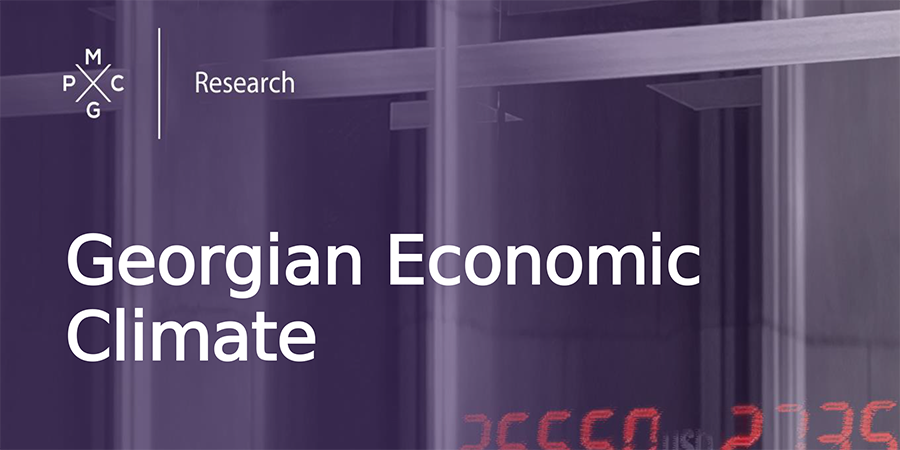
Georgian Economic Climate (Q1, 2025)
06-Mar-2025
In Q1 2025, surveyed Georgian economists negatively assess Georgia’s present economic situation, and their expectations for the next six months are also negative.
They believe that the political crisis had the most significant impact on the Georgian economy in Q1 2025.
The reduction in foreign assistance, including that from the United States Agency for International Development (USAID), was assessed negatively by 97% of the surveyed economists in terms of its effects on Georgia’s economic and political climate.
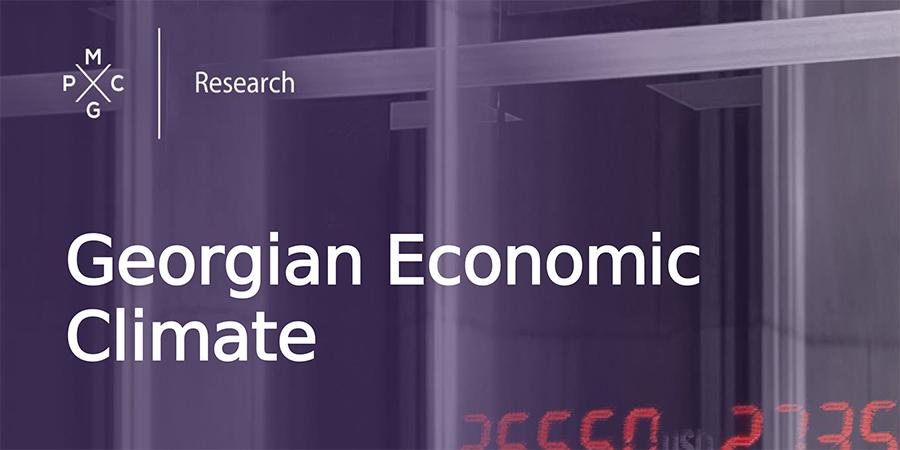
Georgian Economic Climate (Q4, 2024)
16-Jan-2025
Our latest Georgian Economic Climate publication offers assessments of various economic developments by Georgian economists.
Assessment of Georgia’s current economic situation was negative, while predictions for Georgia’s economic situation by the end of the next six months were extremely negative. Overall, their outlook was significantly more pessimistic compared to the previous reporting period. Political turmoil and exchange rate fluctuations had the greatest impact on the Georgian economy in Q4 2024. The suspension of EU membership talks was assessed negatively by all surveyed economists in terms of its effects on Georgia’s economy.
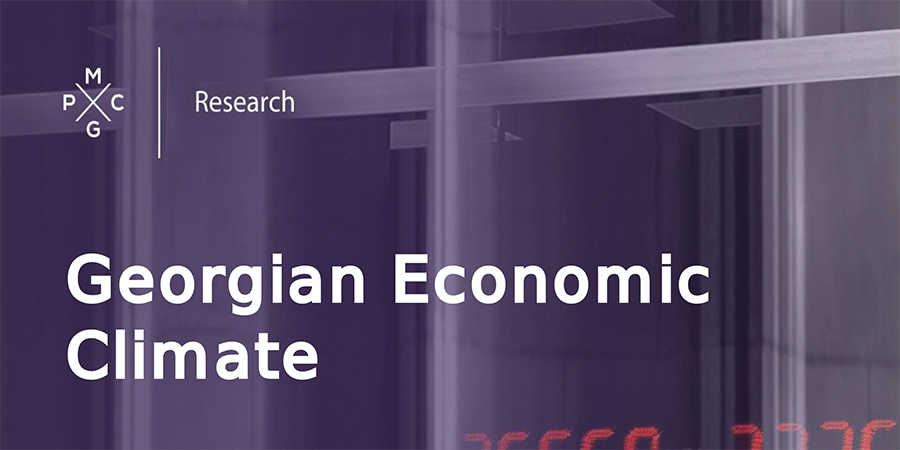
Georgian Economic Climate (Q3, 2024)
03-Oct-2024
Our latest Georgian Economic Climate publication offers assessments of various economic developments by Georgian economists.
Assessment of Georgia’s present economic situation was slightly positive, while predictions for Georgia’s economic situation by the end of the next six months were negative. Overall, their outlook was significantly more optimistic compared to the previous reporting period.
Political instability and labor shortage had the greatest impact on the Georgian economy in Q3 2024.
The pause in U.S. assistance “that directly benefits the Government of Georgia” was assessed very negatively in terms of its effects on Georgia’s economy.
Please refer to the full publication for more insights.
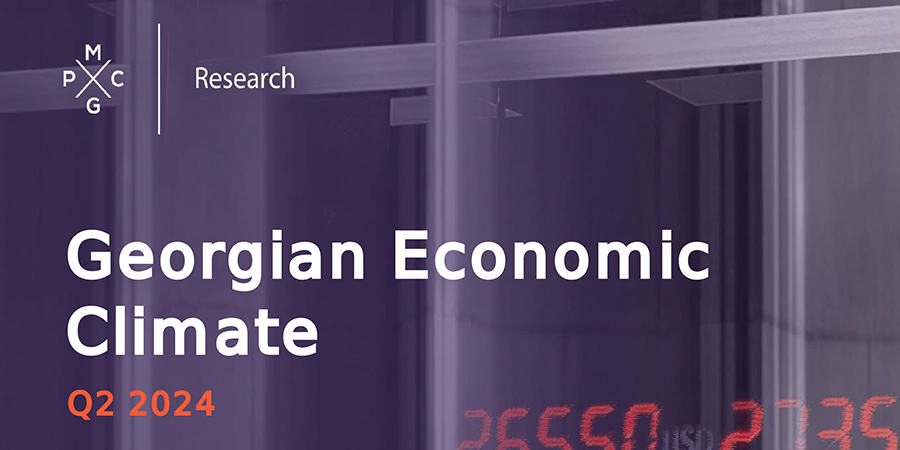
Georgian Economic Climate (Q2, 2024)
04-Jul-2024
The latest Georgian Economic Climate (Q2, 2024) publication offers assessments of various economic developments by Georgian economists.
Assessment of Georgia’s present economic situation was slightly negative, while predictions for Georgia’s economic situation by the end of the next six months were also negative.
Political instability and exchange rate fluctuations had the greatest impact on the Georgian economy in Q2 2024.
The bill on “transparency of foreign influence” is expected to have a negative impact on the EU accession process, FDI inflows, and currency depreciation.
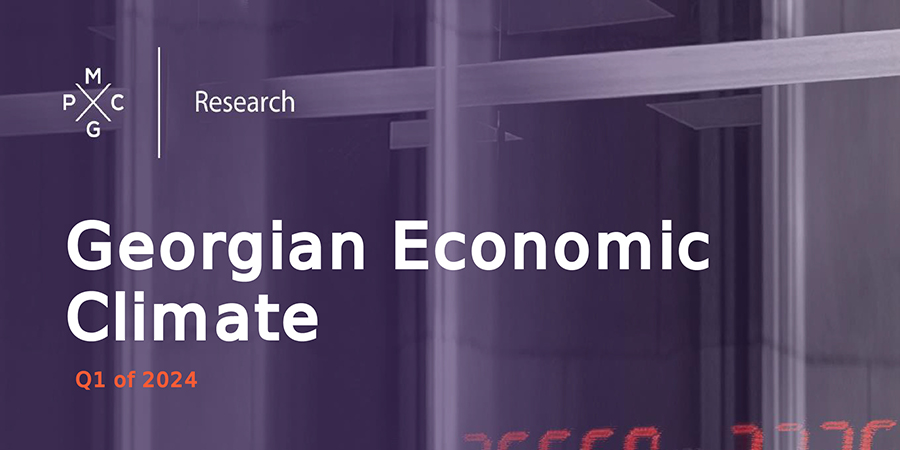
Georgian Economic Climate (Q1, 2024)
11-Apr-2024
Our latest Georgian Economic Climate publication offers assessments of various economic developments by Georgian economists.
Georgia’s present economic situation was assessed positively. Predictions for Georgia’s economic situation for the next six months were also slightly positive.
Export volumes are forecasted to decline, and import volumes are expected to increase over the next six months compared to 2023.
EU candidacy and labor shortage has the greatest impact on the Georgian economy. Additionally, employment and the labor market is the most challenging area when it comes to Georgia’s alignment with the EU standards.
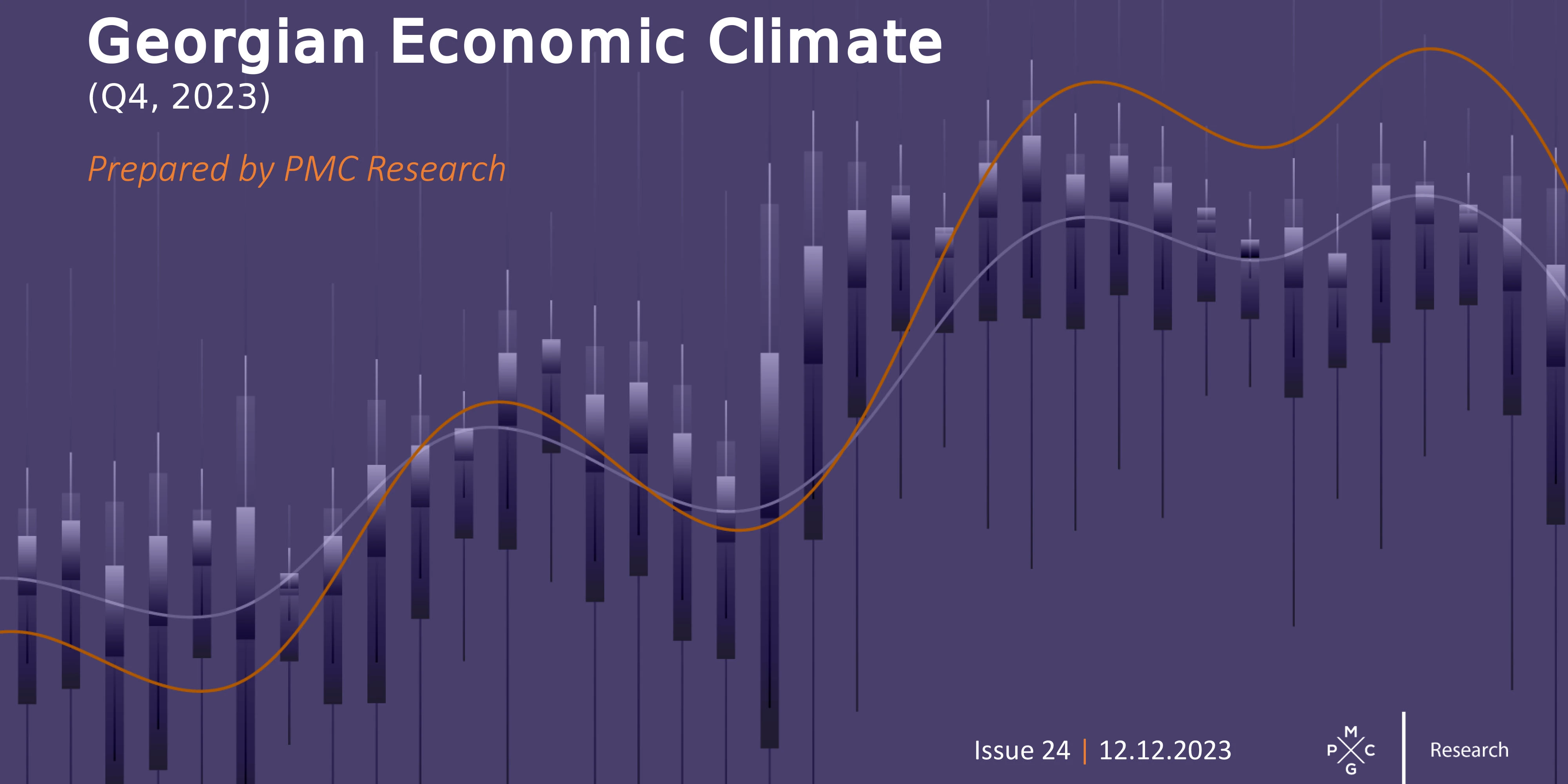
Georgian Economic Climate (Q4, 2023)
12-Dec-2023
The main findings of the survey of Georgian economists conducted in the fourth quarter of 2023 are:
Georgian economists have a positive assessment of Georgia’s present economic situation.
Though their predictions for Georgia’s economic situation for the next six months are also positive.
64% of the surveyed economists identified a labor shortage as the most significant threat to the Georgian economy.
All of the surveyed economists either agreed or completely agreed with the IMF’s concerns regarding the independence of the NBG.
Overall, 76% of the surveyed economists believed that the recent developments surrounding the NBG posed a high or very high threat to the continuation of the IMF’s support program in Georgia.

Georgian Economic Climate (Q3, 2023)
06-Oct-2023
In this bulletin, which is based on the ifo Institute’s methodology, we discuss Georgia’s economic climate, informed by the assessments of various Georgian economists.
The main findings of the survey of Georgian economists conducted in the third quarter of 2023 are:
Georgian economists have a positive assessment of Georgia’s present economic situation.
Though their predictions for Georgia’s economic situation for the next six months are negative.
93% of the surveyed economists think that a labor shortage currently represents a high or very high threat to the Georgian economy.
Almost 78% of the surveyed economists named a high emigration rate as a high or very high threat.
With Turkish Lira hitting a record low, 78% of the surveyed economists think that the decreasing competitiveness of domestic products against cheaper imports from Turkey will have at least a high impact on the Georgian economy.

Georgian Economic Climate (Q2, 2023)
27-Jun-2023
The main findings of the survey of Georgian economists conducted in the second quarter of 2023 are:
Georgian economists have a positive assessment of Georgia’s present economic situation.
Though their predictions for Georgia’s economic situation for the next six months are negative.
63% of the surveyed economists think that Russia’s war on Ukraine as well as labor market problems like skills mismatch and labor shortage (lack of qualified personnel) currently represent a high or very high threat to the Georgian economy.
More than one year since Russia launched its war on Ukraine, nearly half (47%) of the surveyed economists claimed they are uncertain about how to assess the overall impact of the war on the Georgian economy.
Almost 90% of the economists agree with the decision of National Bank of Georgia (announced on 10 May, 2023) to loosen its monetary policy and decrease the policy rate by 0.5 percentage points from 11% to 10.5%.
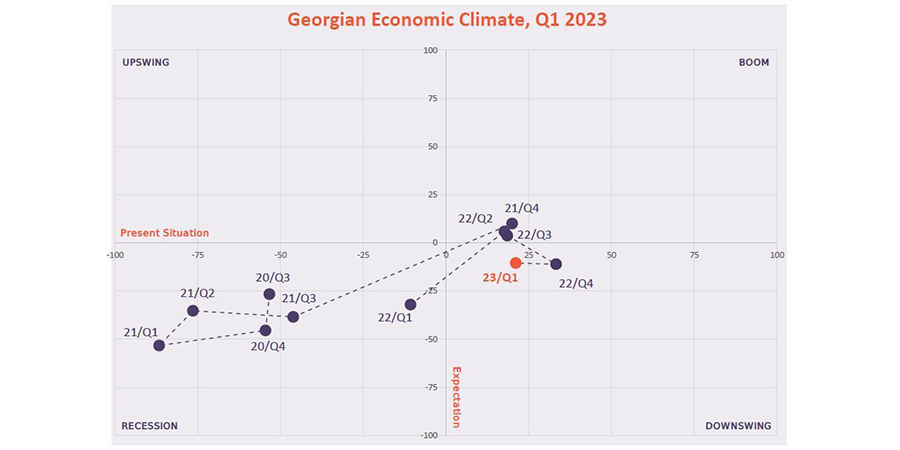
Georgian Economic Climate (Q1, 2023)
13-Mar-2023
The main findings of the survey of Georgian economists conducted in the first quarter of 2023 are:
The surveyed Georgian economists positively assess Georgia’s present economic situation.
Though their predictions for Georgia’s economic situation for the next six months are negative.
The surveyed Georgian economists’ prediction for real GDP growth for 2023, on average, is 5.5%.
Almost 83% of the surveyed economists think that Russia’s war in Ukraine currently represents a high or very high threat to the Georgian economy. Meanwhile, a skills mismatch was assessed as a very high threat by nearly half of the surveyed economists (44%).
One third of respondents (33%) think that the “GOG Vision 2030 - Development Strategy of Georgia” partially responds to the challenges and problems faced by Georgia but none of the respondents think that the strategy fully addresses them.
Regarding the EU Commission’s analytical report on Georgia’s alignment with the EU acquis, the majority of surveyed economists (75%) think that introducing improvements with respect to the environment and climate change mitigation in line with the EU acquis will be challenging or very challenging.

Georgian Economic Climate (Q4, 2022)
07-Dec-2022
The main findings of the survey of Georgian economists conducted in the fourth quarter of 2022 are:
Georgian economists have a positive assessment of Georgia’s present economic situation.
Though their predictions for Georgia’s economic situation for the next six months are negative.
Almost 90% of surveyed economists think that high inflation currently represents the highest threat to the Georgian economy.
94% of surveyed economists think that among other policy approaches tighter fiscal policy is likely to be the most effective in tackling inflation in Georgia. Similarly, 89% believe in the effectiveness of imposing a tighter monetary policy.
The majority of Georgian economists (44%) think that the Estonian model for profit tax should be applied to the financial sector in Georgia from 2023.
- Periodic Issues
- ECONOMIC OUTLOOK AND INDICATORS IN GEORGIA
- HOTEL PRICE INDEX
- PMC RESEARCH - IFO GEORGIAN ECONOMIC CLIMATE
- BLACK SEA BULLETIN
- QUARTERLY TOURISM UPDATE
- ECONOMIC OUTLOOK AND INDICATORS IN UKRAINE
- SECTOR SNAPSHOTS
- EMPLOYMENT TRACKER
- MACRO OVERVIEW
- BAG Index
- Profile Of Bilateral Relations

